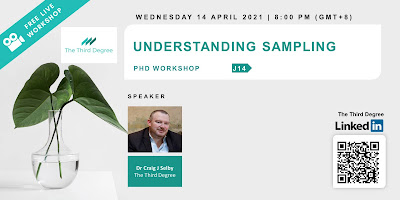Upcoming Webinars | April 2021
[NOTE: Webinars are held every Wednesday 8pm GMT + 8]
This April we are covering a range of topics; both research methodology and communication based. Feel free to register for any of the topics that interest you, and of course, email us if you have any special requests (solutions@thethirddegree.asia).
Getting the Most From Your First Conference (7 April)
Making inferences about a population of interest is often essential for scientific inquiry. This can be important both in traditional social science research, for example when using probability surveys, as well as in new forms of data, for example sampling from large amounts of data. Furthermore, understanding sampling can enable researchers to appraise the strengths and limitations of research methods and guide them towards more valid and robust ways of collecting and analysing data.
This webinar provides an overview of sampling techniques frequently used in survey designs. In particular, it focuses on the principles of designing and selecting samples of individuals. These principles are also discussed in terms of the effects on inference to the population of interest, the key goal of survey research. We will also briefly discuss weighting and its role in making inferences about the population.
Conducting Personal Interviews (21 April)
You get a whole chapter to defend and outline your methodology. From explaining the methodological gap in prior studies through to outlining your unique approach and execution to your research, and backing that up with evidence to highlight its credibility. This webinar talks about not only what assessors expect in the methodology chapter, but ideas on how to write that - including choice of vocabulary, sentence structure, and how to explain complex ideas in a sound way.





Comments
Post a Comment